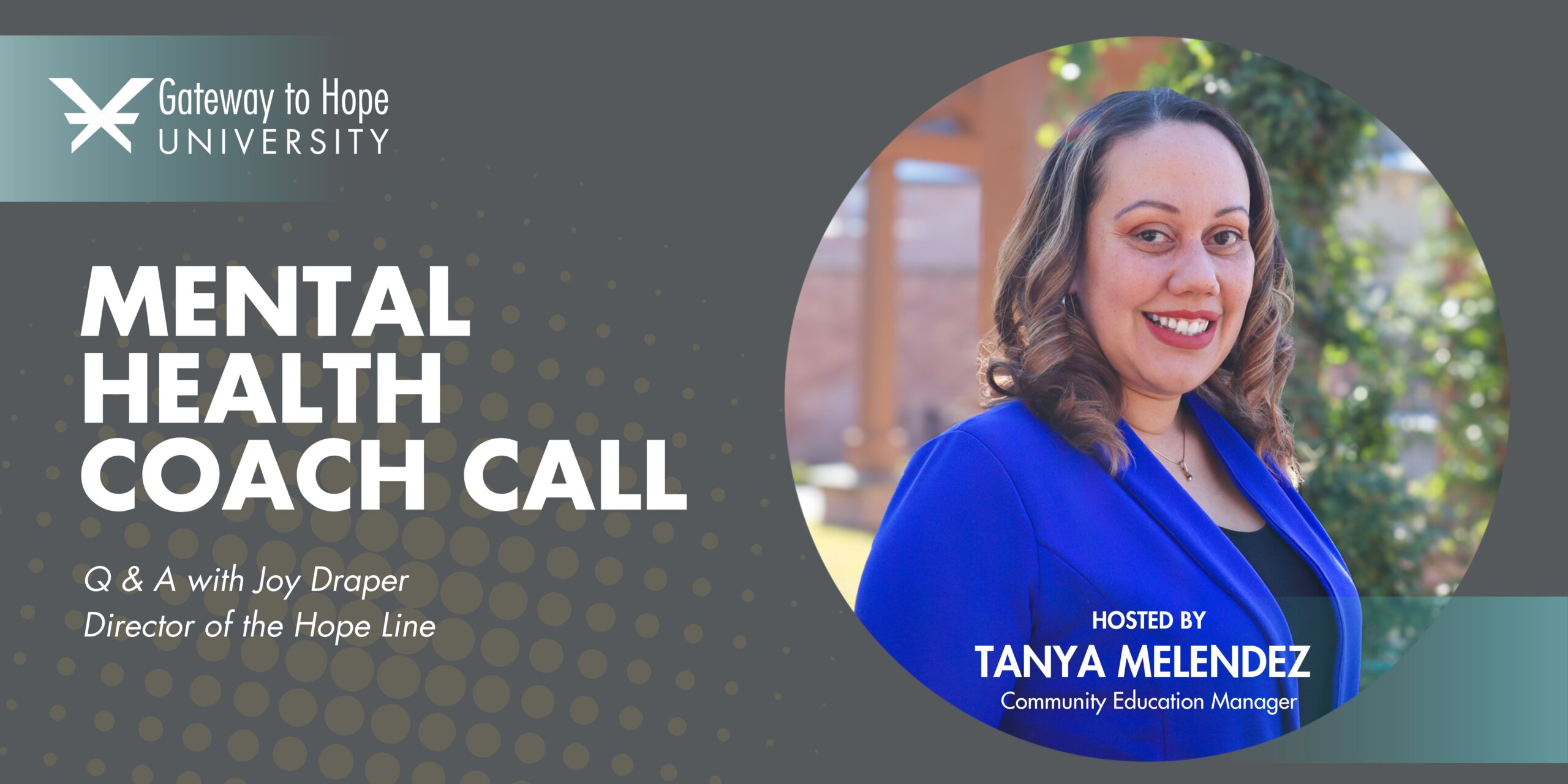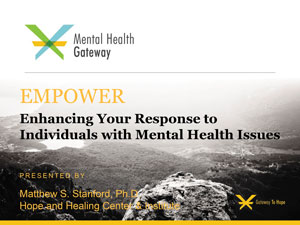
Tanya
Forum Replies Created
-
Tanya
Member06/16/2025 at 3:13 pm in reply to: SUPPORTING THE PROMOTION OF MENTAL HEALTH USING TRUTH AND CONNECTION – John CaesarJohn, I agree that education and open conversations are key to breaking stigmas and creating an environment that promotes healing and spiritual growth. There are many ways to do that but you have a great outline that will help you facilitate those conversations. In my years as a Mental Health Coach, I have found testimonials to be very impactful. Testimonials have a way of breaking down stigmas and normalizing mental health struggles within our community.
Your use of first person or “I” statements is also very important. It is easy to say “we do this” or “men are like that” but when you have the individual use an “I” statement, it requires reflection and accountability. These types of statements lead to personal growth, acceptance of additional support / referrals, and recovery.
Thank you for your work in the mental health community. I look forward to reading all of the testimonials from your work as a Mental Health Coach.
-
Kent, please share your outline in the text box provided. No outline was posted. Thank you.
-
Tanya
Member06/16/2025 at 1:34 pm in reply to: Plan for Purposeful Engagement Within My Community – Pamela UrbanThank you for sharing Pamela. Taking the first step to become a Mental Health Coach takes courage and I applaud you for that, especially as a trauma survivor with your own mental health journey. While you may have a unique niche in connecting with individuals such as yourself, never limit yourself to coaching just one segment of the population or those in mental health distress. In my experience as a Mental Health Coach, we do not need to have the same life experiences to make an impact. We just need to have a compassionate ear to lend and a willingness to serve those in our community. Your testimony may be just the motivation an individual needs to hear to start their own mental health journey to recovery.
Reaching out to your current networks, groups, or faith communities is a great place to start building your network. Just this past weekend I was reminded of how faithful God is to put us in the right place with the right connections. A personal connection that I had was just the right referral source for a mother and her adult son. I sent one message and within minutes I was given information to share and a place for her son to get the assistance he needed. It truly is important to cultivate those connection with providers and remind them that you are there to help them as well if they should have a referral for you.
I truly look forward to hearing all of the amazing things that you are going to do as a Mental Health Coach. Thank you for bridging the gap in the mental health community. Don’t forget to join our private Facebook Mental Health Coach Network to stay in touch with our Mental Health Coaches in your area and nationwide.
https://www.facebook.com/share/g/16SKt3Lzob/
facebook.com
Log into Facebook to start sharing and connecting with your friends, family, and people you know.
-
Mary, that sounds like a solid plan. It is always best to start closer to home per say and build a network that way. Of course, it is best to have a conversation with those individuals / networks to see if they have the bandwidth to take on new referrals. I would also encourage you to look around the Mischer Behavioral Health Resource Center page and see what other providers and resources are available there as well.
This past May, I hosted Joy Draper on our monthly Mental Health Coach Call. Ms. Draper is the Clinical Director of the Hope and Healing Center & Institute and she oversees The Hope Line. This Coach Call provided a lot of insight in how to best use The Hope Line as a referral source and all of the referrals provided. I think this would be a great webinar for you to watch as you work to build your referral network. I look forward to hearing all of the great things you will accomplish as a Mental Health Coach.
https://learn.gthu.org/courses/mental-health-coach-call-may-coach-call/
learn.gthu.org
Mental Health Coach Call: May Coach Call - GTHU
During this Mental Health Coach Call, we’ll host a live Q&A to walk Mental Health Coaches through the resources available to them via The Hope Line and how to leverage these tools to enhance their coaching journey. What you'll learn: … Continue reading
-
Ashley, does your church currently have a Mental Health Ministry? I think leading peer support groups is a great 1st step in raising mental health awareness within your church. The Transformed workbooks provided in the Mental Health Coach training are a great resource with an easy to follow format.
If you would like additional information on support groups, check out this training on how to use the Transformed workbooks in a support group setting.
learn.gthu.org
Introduction to Support Group Training Many people find peer support a helpful tool that can aid in their recovery. Support groups are offered as a safe space where individuals can come together to share their stories, experiences, and lives in … Continue reading
-
Jennifer, sharing your story is a powerful way to break stigma but some people may be reluctant to share their story right off the bat. What methods or techniques could you use to encourage individuals to open up and share their stories?
-
Tanya
Member06/09/2025 at 12:49 pm in reply to: Loving Them Well, Even When I Can’t Fix It – Norma AvilaNorma is this so true. Our job is not to fix people or have all the answers. Our job as a Mental Health Coach is to listen with compassion, provide them with resources and tools to make the best decision for them, and to help them restore their identity in Christ and the community.
I hope that the resources provided in the MHC training allows you to better assist your clients and walk these pregnant women through life’s challenges. I look forward to hearing about all the positive impact your training as a Mental Health Coach will have on the community you serve. Thank you for taking the step to bridging the gap in the mental health community.
-
Scott I agree. So often, those struggling with mental health distress are misunderstood or criticized by those closest to them. I think we as a society need to do better and learn how to properly relate to individuals struggling with mental health distress. Jesus taught us in the bible how to treat people with empathy and compassion but it is one of the hardest things to do. Over time, we get better at it but do not be discouraged if in the beginning of your Mental Health Coach journey you don’t always get it right. Take a breath, remember your training, and never be afraid to ask another Mental Health Coach for help in working with an individual that you are struggling to connect with.
I also loved how you said to pray and offer spiritual encouragement without pressuring them. This is key. Even though you may be working with a faith based organization, not every one that walks through those doors may have the same faith, level of faith, or be in a place to accept that type of support. I know that in my time as MHC, I have said, “It’s ok if you don’t want us to pray right now. I will add you to my prayers and we can discuss this at a later date when you are ready to do so.” In my experience, many individuals were accepting of the prayers just not being forced to participate in the moment.
I look forward to hearing about all the positive impact your training as a Mental Health Coach will have on the community you serve. Thank you for taking the step to bridging the gap in the mental health community.
-
Good afternoon Karen. Your final project did not come through. Can you please submit your final project as a response below? Thank you.
-
Tanya
Member06/09/2025 at 12:18 pm in reply to: Helping discover clients struggling with mental illness in pregnancy center appointments as a volunteer – Barbara JohnsonThank you Barbara for the years of service you have dedicated to pregnant women and their struggles. Pregnancy is such a beautiful time in a woman’s life but you are right, it comes with a lot of emotions, pressures, and outside struggles. As a Mental Health Coach, I hope that you are better equipped to assess your one-on-one sessions and compassionately guide the conversations to a place of healing and acceptance. It is vital to understand where our knowledge ends as Mental Health Coach and when a licensed professional is best suited.
In my experience and years as a Mental Health Coach, I believe in transparency. I have told individuals, “I believe the best way that I can help you going forward is to bring in or put you in contact with this individual (referral source) who can help you with this situation going forward. We can continue to meet until you get comfortable with them or if you are comfortable with us ending our coaching here, then we can do that. Whatever works for you.” Taking this approach allows the individual to feel in control of the transition as well as supported in whatever decision they make.
I look forward to hearing about all the positive impact your training as a Mental Health Coach will have on the community you serve. Thank you for taking the step to bridging the gap in the mental health community.
-
Ending the stigma is something Jesus himself came to do. If you look at the Transformed workbooks, you will find bible based scenarios in which Jesus helped those afflicted with mental health issues through love and compassion. I think using these bible based scenarios will be a great starting point for you and your church to use, as you build your mental health ministry.
Another great resource is Dr. Matthew Stanford’s book, Madness & Grace. This book talks about the mental health industry, the historical impact the church has had on bridging the gap in the mental health community, and developing a mental health ministry in your organization. There are also some great success stories that may help change the minds of those doubting the need for such a ministry in your church. I look forward to hearing all of the great things your church is going to do in the mental health community.
-
JJ, I like this method. I agree that many individuals come to a pastor or organization because they have some level of comfort with them. The initial thought that they would have to be referred to someone else can create some level of anxiety that would make the individual hesitant to accept the referral. Understanding this and having a plan for it can make the process less stressful for both sides.
As we all know, mental health care providers are in short supply with long waitlists. Having a list of community providers that can provide interim care or services is something to consider. The Hope Line makes it a point to provide at least 3 different referral options to help with this issue. The Hope Line itself can be used as a resource to talk it out for 30 minute sessions if needed. The Hope Line is available 365 days a year from 5 pm – 8 pm CST at 832-831-7337.
-
Grace, these are some excellent grounding techniques that work quite well. I often tell those that I am mentoring or coaching, not every technique is going to work on every individual. It is important to have a variety of tools and resource available. Don’t get frustrated if you have to try a couple of techniques before you can get the client to re-focus and calmly share their thoughts and emotions. As you begin your MHC journey, these tools are highly effective but I look forward to hearing what new tools and techniques you develop along that way. Sharing our experiences makes us better MHCs. Thank you for taking the 1st step to bridging the gap in the mental health community.
-
Stephen, this is a great plan. I think you should consider incorporating use of GTHU’s free Empower training as a tool and resource to those who will be working with you or those who will be part of the individual’s support system. Empower gives a basic understanding of what mental health distress looks like and how to respond compassionately.
In the Transformed materials provided in your training, there are several scenarios for you to use in your mental health campaigns. Creating an atmosphere of compassion and understanding is so important. You are on the right track to making a difference in the mental health community. I look forward to hearing all of the wonderful things your organization will do in bridging the gap in the mental health community.
-
Thank you William for your service to your community and your congregation. There are so many times that people just want to be heard and their feelings validated. We live in a world that wants to argue their point that we have failed to validate each other’s thoughts or feelings. This doesn’t mean that we have to agree with them or their beliefs but rather understand that they may have perceived things in that way. Once we do that, we can usually work towards a resolution that helps the individual move forward.
Silence and patiently waiting are hard to do in a world of instant gratification. I agree that we must sit in silence sometimes to hear God, workout our own thoughts, or process the information in front of us. I myself sometimes struggle in sitting still long enough to put this into practice. When I do manage to actively sit in silence, I find that clarity and the next steps seem much more rewarding than rushing to a decision or judgment.
When I host groups or talk one-on-one with individuals, I often go over the rules of the session. One of the rules we use it that we allow time for silence or pauses. I believe that this is an important rule to go over so that individuals who are not used to this method, do not feel neglected or unheard. An explanation that we allow time for silence so that the holy spirit can reveal things that need to be discussed or shared can have the space to do so helps individuals get used to the idea of silence as a positive thing. I have also found that silence allows for those who usually don’t share, will speak up once those more comfortable sharing stop talking.



